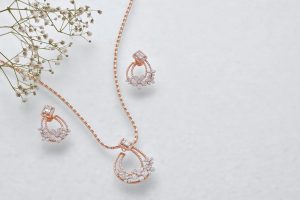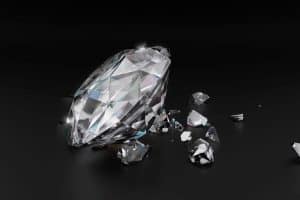This article may include affiliate links and elements that were carefully created by our team using advanced ai to help you envision the best style advice.

The quick answer is yes. Ethically sourced diamond rings that have been graded by the Gemological Institute of America (GIA) have serial numbers. They also have diamond certifications.
That said, not all diamonds have serial numbers, and the process of certifying a diamond can be complicated. Let's dive into the details of diamond serial numbers and certifications so you can return to your shopping better informed.
How Do You Know If A Ring Has A Serial Number?
As we mentioned, not all diamonds have serial numbers. Diamonds receive their serial numbers after they've been assessed and graded by the Gemological Institute of America, or the GIA. These serial numbers verify that the diamond in question has entered the United States legally and that it is of the quality that its seller claims it is.
You further verify the quality of a diamond by looking over its certificate. Diamonds must receive serial numbers to be awarded certificates. Likewise, you should receive a certificate if you buy a diamond that has a serial number.
If you're purchasing a diamond outside of the United States, your diamond should still have a certification and serial number if it has entered into the country legitimately. However, those diamonds will go through different certifying institutions.
How Do I Find A Diamond With A Serial Number?
The vast majority of jewelers carry diamonds that have received a GIA grade and serial number. So long as the jeweler you visit is reputable, then you won't have to worry about receiving an unethically-sourced diamond.
Where Is A Diamond's Serial Number?
So long as your diamond has been graded and certified, you should be able to find its serial number. That said, serial numbers are not big, gaudy etchings that take away from the beautiful appearance of a diamond.
Instead, you'll most likely need a microscope to find your diamond's serial number. These numbers are engraved with a laser onto the girdle of your diamond. The girdle is a diamond's outer edge. It can be found between the upper and lower crown and pavilion facets.
To find more certified diamond rings like this one, you can visit Amazon.
It's not recommended that you try and identify a diamond's serial number without the help of a professional jeweler. You may accidentally damage your diamond if you do, given the discreet location of the engraving.
Why Should Diamonds Have Serial Numbers?
As has been mentioned, diamond serial numbers let you know that your diamond, specifically, has entered the country legally and been processed by industry authorities. There are other reasons, though, that you may want to purchase a certified and numbered diamond, including:
- Verification of your diamond's cut, carat weight, clarity, and color, otherwise known as the four C's. A legitimate and professional jeweler should be able to provide you with your diamond's certification if it has been assessed by the GIA.
- Diamond serial numbers can help you reclaim your jewelry if it is ever stolen or lost.
- If you sell your diamond, offering a diamond with a serial number can result in a sale of greater value than if you did not.
Does A Serial Number Decrease The Value Of A Diamond?
A serial number neither decreases the value of your diamond nor does it impact the diamond's appearance. Because the serial number is engraved on your diamond's girdle (and is microscopic), you won't be able to see it, as the girdle typically rests in or on the diamond's setting.
In fact, serial numbers may increase the value of your diamond, as you'll be able to verify to future buyers that it's been graded and certified by the GIA.
Do Tiffany Rings Have Serial Numbers?
As of 2000, Tiffany engagement rings and other diamonds all come with certifications and serial numbers. Not only will the applicable diamonds be registered with the GIA, but Tiffany & Co. will provide the diamonds with a unique SKU number that will enter into the company's own database.
To find more certified diamond rings like this one, you can visit Amazon.
Likewise, Tiffany diamonds on any piece of jewelry will come with a certification. Do note, however, that you'll only receive one certificate per jewelry piece you take home.
Do All Diamonds Have Serial Numbers?
Not all diamond rings, as we've mentioned, have serial numbers, but any that have been brought legally into the United States or their country of sale will.
That said, some legally-procured diamonds lack a serial number simply because of cost. If a jeweler works independently, she may not have the funds to have her diamonds registered with the GIA.
Some diamonds, however - including many sold by less-than-reputable jewelers - enter into the country illegally or unethically. These diamonds are typically available at a decreased rate, but you're unlikely to receive a certificate with them upon their purchase. If you do receive a certificate, it may be self-awarded or awarded by a third-party institution not recognized by the GIA.
Note that you're not going to get in trouble if you purchase a diamond ring that doesn't have a serial number. The jeweler might, depending on her relationship with the GIA and the manner through which she procured her gems, but consumers are not legally responsible for the behavior of their jewelers so long as they're unaware of any foul play.
Can Diamond Rings Be Traced?
Serial numbers do more than help law enforcement representatives find your jewelry after it's been stolen. You can use your diamond's serial number to discover the exact location where your diamond was mined from. In this sense, diamond rings with serial numbers are relatively easy to trace.
What's the need for that ease? Once again, a number of diamonds are mined, assessed, or sold unethically. Known as conflict diamonds, diamonds that come to new owners after significant distress are illegitimate - meaning only that they haven't been registered with the GIA and that the appropriate, official bodies would be able to track their history back to some form of conflict.
Again, a consumer won't get in trouble for purchasing an illegitimate diamond so long as they're unaware of the ongoings that brought it into the country. Understanding the intricacies of the diamond industry isn't easy for anyone.
Can I Sell A Diamond Ring Without a Certificate?
We've mentioned a diamond certificate a few times throughout this guide. You'll find a diamond's serial number on its certificate, and most reputable jewelers will provide you with a certificate upon a point of purchase.
Diamond certificates detail:
- A diamond's cut
- Carat weight
- Color
- Clarity
- Finish
The GIA isn't the only organization that certifies its diamonds. Others include the AGS and the HRD. Tiffany Co., too, has its own certification process. Certification and serial numbers from any of these organizations will verify your claims about your diamond's worth.
That said, not all diamonds come with certificates. If you're looking to sell a diamond without a certificate, you can. However, without a certificate, you may find that the value of your gem decreases.
Buying a diamond is a complicated process. If you want to be able to track the diamond you buy, make sure your gem of choice has a serial number and affiliated certificate. Even though you'll be alright without either, these identifiers will benefit you in the future.





